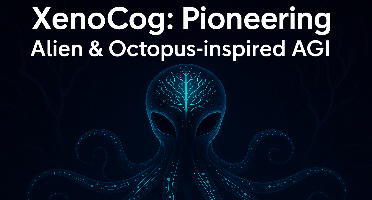
Gabriel Axel Montes
Project OwnerGabriel will lead, manage, and execute the research project, including intellectual direction, and decision-making over areas of interest and pursuit throughout the project.
DEEP Connects Bold Ideas to Real World Change and build a better future together.
Coming Soon
Milestone Release 1 |
$6,250 USD | Pending | TBD |
Milestone Release 2 |
$6,250 USD | Pending | TBD |
Milestone Release 3 |
$6,250 USD | Pending | TBD |
Milestone Release 4 |
$6,250 USD | Pending | TBD |
Advanced superintelligence could function like a new species, yet AI research lacks concrete studies of genuinely non-human, “alien” minds. Neuroscientist Dr. Gabriel Axel Montes, collaborating with SingularityNET, has been developing a cognitive-neuroscience-based AGI motivation framework that lets developers tune agent personalities for robotics, finance, and metaverse avatars. Partnering with octopus-cognition expert Dr. Sidney Carls-Diamante, this project breaks novel ground with a rigorously specified, open-source motivational framework inspired by cephalopod (octopus) and other non-human intelligence.
Develop a modular and extensible framework for integrating various motivational systems into AGI architectures, supporting both human-like and "alien digital" intelligences. This could be done as a highly detailed and precise specification, or as a relatively simple software prototype with suggestions for generalization and extension. Bids are expected to range from $15,000 - $30,000.
New reviews and ratings are disabled for Awarded Projects
Check back later by refreshing the page.
detailed research plan will be produced with a projected timeline. Optionally existing work to date on the human-level motivational framework will be reviewed and analyzed for existing “levers” for alien motivational control. Neurocognitive/psychological theories will be examined to collect a list of potential functions that may be most proximal to alien-like and octopus cognition.
1. A document containing a detailed research plan and proposed/anticipated timeline. 2. A list of potential functions/features of the existing motivational framework (work already undertaken by the main proposer) that can be used as preliminary links to the alien-like framework with a brief explanation of why each function may be relevant. Additional motivational functions/features not yet explored may be listed if relevant. If human factors are better left to a later milestone due to the early stage then this deliverable is optional.
$6,250 USD
Relevant cognitive literature will be examined to identify properties features architectures and functions of the octopus nervous system and behavior that would be used as a foundation for developing a framework. Existing credible research on non-human intelligence will be examined to gather and begin inferring their properties of cognition intelligence and consciousness. Preliminary ideas on possible morphologies e.g. robotics and virtual avatars based on the research progress will be offered (to be refined in subsequent milestones).
1. Early-stage version of conceptual outline and schema demonstrating how the octopus nervous system’s properties map to observed and inferred/theoretical motivational and cognitive capacities. 2. Early-stage version of conceptual outline and schema that lists properties of non-human intelligences (as covered by and inferrable/derivable from credible research literature) and correlates them with motivational and cognitive properties.
$6,250 USD
Research continues to progress toward maturity. Links to human-level cognitive/motivational elements become more clear. Alien-like morphologies for robotics/avatars also become clearer. Novel alien OpenPsi-like motivational functions are created. Optionally at this stage potential ethical factors are considered (otherwise completed in a later milestone). Specifications for motivational framework have taken shape and are making substantial progress.
1. 75%-complete conceptual outline and schema demonstrating how the octopus nervous system’s properties map to observed and inferred/theoretical motivational and cognitive capacities. 2. 75%-complete conceptual outline and schema that lists properties of non-human intelligences (as covered by and inferred from credible research literature) and specifies motivational and cognitive properties and potential behaviors/affordances. 3. Partial work completed on possible actions/gestures/expressions that may be exhibited by a non-human intelligence. 3. (Optional) Any initial ethical observations/considerations noted thus far based on the work are included in the document. (Otherwise this can be reserved for the final milestone.)
$6,250 USD
This stage will encompass the finalization of the framework specification complete with cognitive parameters that allow modulation motivational framework features and action-selection by an AGI system including Hyperon. The specification will be ready for OpenPsi/Hyperon.
1. Finished specification document complete with alien-like motivational architecture and motivational/cognitive/’psychological’ parameters 2. Portion of specification document that details list of possible actions/behaviors and gestures/expressions and examples of such behavior by an avatar or robot with alien-like motivational structures. If any new potential robotic morphologies/forms were discovered in the research they may be disclosed here as well. 3. Portion of document with complete ethical considerations that have arisen from the work. Backend code that directly links BCI signal(s)/feature(s) to motivational feature(s) allowing for modulation of the latter by the former. This will allow use of representative neurotech signals e.g. EEG to modulate parameters in a motivational system. 4. Optional: Inclusion of motivational system in a functioning user interface which has been separately under development for human-level motivation frameworks. This will depend on readiness of the UI and its backend system to accommodate the alien-like motivational system; however barring any unexpected changes we anticipate decent chances of this happening as this UI is work that has been managed by Dr. Gabriel Axel to date and can optimally be maneuvered accordingly.
$6,250 USD
Please create account or login to post comments.
Reviews & Ratings
New reviews and ratings are disabled for Awarded Projects
Check back later by refreshing the page.
© 2026 DEEP Funding
Sort by